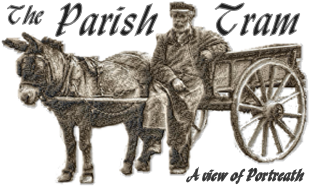A beauty spot was left blanketed with an assortment of debris, litter and junk following the eviction of a travelling community who occupied the site for several months.
L Assorted rubbish and scrap left by travellers at Nancekuke on the cliffs between Portreath and Porthtowan. Picture by Cornwall & Isles of Scilly Press
Now council tax payers are left to pick up the bill Joe Dyer reports
The group had moved last spring onto former mine workings between Porthtowan and Portreath on the world-famous South West coastal footpath. After months of behind-the-scenes work Kerrier District Council took out a court order to have the 13-strong group evicted, though one family remained when officials arrived on site on February 3.
Villagers and community leaders were horrified by the amount and variety of rubbish left behind by the travellers at a spot which is popular with walkers and holidaymakers.
"It makes St Day tip look like Buckingham Palace lawn. It's a pretty sad site," said John Beckinsale, a long-term resident of Porthtowan.
Cornwall & Isles of Scilly Press photographer Colin Higgs, who took these pictures for the West Briton, was stunned by what he saw. "It took my breath away. It's absolutely disgusting," he said. "Everything you can think of is on the ground - tables, bits of caravans, endless fires, children's toys, mobile phones, hundreds of gas bottles. There is an incredible amount of filth."
County councillor Richard Cooper said: "I'm not anti-traveller, all I'm anti is the mess being left behind, and we have to tackle the problem.
"Ultimately it's the public who will have to pay because it's the local authority that will have to move it."
A team from Kerrier's Direct Services was on site with a digger and clearing equipment this week having already secured the area by fitting a new gate on an approach road. A spokesman said they aimed to have carried out a full clean-up operation by the weekend.
Liz Dunstan, chief solicitor for Kerrier, sympathised with villagers who had put up with their sometimes unwanted neighbours for so long. But she stressed the onus was on the council to do everything above board.
"You have to do it professionally and correctly, taking account of everybody's situation otherwise we would still be open to challenge and we could still be in this position in a year's time."
Assessments were made of the families and of the site itself before the court could evict.
"It was on the coastal footpath, it was very exposed and it was very dangerous," said Mrs Dunstan. "We never tolerated the site and we never said it was suitable."
Even though the travellers had left so much rubbish, she said the council would never have agreed to weekly removals as this would have legitimised their presence.
The travellers were believed to beheading to a site out of Cornwall.
However, this may not be the end of problems with the travelling community. Mrs Dunstan warned that new Government legislation placed the responsibility on local authorities to find sites for travelling families.
